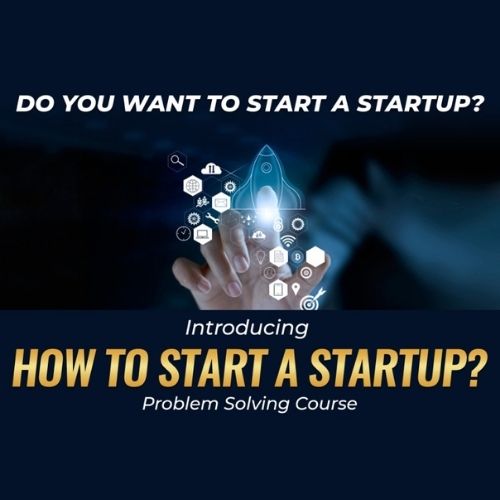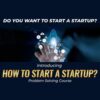How to Start a Startup?
- Steps to build on your startup idea
- Learn to manage investor relations
- Know fundamentals behind fund raising Learn how to hire your team
- Know about ESOPs and how to use them to hire great talent
- Learn ways to market your products in the case of low budget
- Avoid mistakes that leads to startup failure
Description
This course is designed for budding entrepreneurs, students, entrepreneurs, wannapreneurs, solopreneurs, or any person who wants to start a business or grow his startup and make it successful.
- Learn how to do end-user profiling.
- Learn how to do market segmentation.
- Learn how to determine the Total Addressable Market (TAM).
- Learn how to create a perfect customer persona.
- Learn how to prepare high-level product brochure.
- Learn how to identify your next 10 customers.
- Learn how to identify the core of your startup.
- Learn how to convert your prospective customer to paying customer.
- Learn how to make a successful business model.
- Learn how to decide the pricing of the product.1) Market segmentation2) Beachhead market3) End-user profile
4) Beachhead Total Addressable Market (TAM)
5) Persona
6) Life cycle use cult
7) High-level product specifications
8) Quantify Value Proposition
9) Next 10 customers
10) Define your core
11) Chart competitive position
12) Determine the decision-making unit
13) Map customer acquisition process
14) Follow on TAM
15) Design business model
16) Pricing framework
17) Lifetime Value (LTV)
18) Map sales process
19) Cost of Customer Acquisition (COCA)
20) Identify key assumptions
21) Test key assumptions
22) Define Minimum Viable Business Product (MVBP)
23) Show “The Dog Will Eat Their Own Dog Food”
24) Develop a product plan
- Steps to move from passion to idea and technology
1) Knowledge: Deep knowledge of a subject
2) Capability
3) Network: The people you know and are going to support you when you start a startup.
4) Financial assets: As it is said that 95% of the startups fail in the first 3 years of execution, it happens because of the lack of finances.
5) Established brand: You need to check whether you already have an established brand or you have something on which you can build something. The brand can also be of your co-founder or you can partner with someone who has a big brand. In such a case, you have an added advantage.
6) Past work experience
7) Commitment: You need to check how much you are committed towards your idea or technology.
8) Find a founding team: Startup is not a lonely journey and therefore, you will have to find a founding team. There are many individuals who are founders on their own but they set-up a very strong management team.









